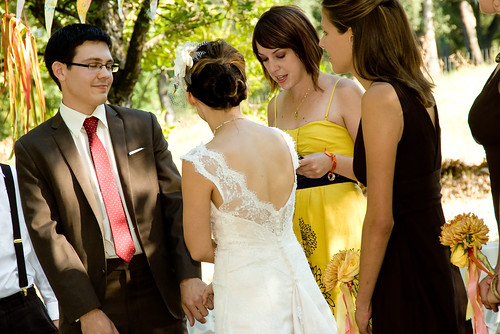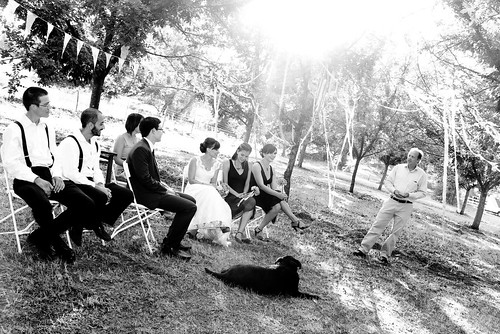Why hello again...
I've sort of been out of the wedding blogging loop for a bit now, but since wedding season is upon us, and I have some things to post from a wedding I attended last weekend, I thought I'd answer a few questions that people have been pestering me about!
(Just kidding, the pestering is a welcome thing!)
While we are not Quakers, we will be holding our wedding ceremony as an edited version of a Quaker Friends Meeting, or Quaker ceremony. After we say our promises to each other, our guests will have an opportunity to say something nice before we exchange rings. Heartfelt toasts or excerpts from texts are examples of what you might prepare for the ceremony. Messages may be literal or metaphorical, and about anything appropriate to the joy and solemnity of the occasion—love, family, marriage, life, or what you will.
Please keep your message relatively short (no more than a few minutes) so that all those who would like to speak will have a chance to do so without the ceremony going on for hours!
Wikipedia says this about Quaker ceremonies:
Since traditionally Friends have no clergy, there is no one person to “marry” them. Instead they declare themselves married before God and those gathered. Usually, there are no bridesmaids or other special roles in the wedding other than that of bride and groom.
The couple then signs the Quaker wedding certificate which, for the purposes of the meeting, means they are now married. All those present are invited to share messages with the gathered meeting as they feel led (as in any other Meeting for Worship, see main article on the Society of Friends). At the close of worship all those present at the meeting are asked to sign the wedding certificate as witnesses. Often the certificate is hung prominently in the home of the couple as a reminder of the promises they made, and of the people with whom they shared that moment of their lives.

Since some of our guests don't have internet, we also casually spread the word to our friends and family and asked that they pass the message along to other family members and friends. We didn't really go out of our way to push this, but we knew the word was getting around a bit.
Finally, at the ceremony we had our officiant/friend say this:
At the beginning of the ceremony, the bride and groom will stand and exchange vows. After this, anyone may stand and speak if so moved. While messages are welcome, periods of silence are expected and are a time for reflection.
If you would like to speak, please stand as the last person finishes. Messages may be literal or metaphorical, and about anything appropriate to the joy and solemnity of the occasion—love, family, marriage, life, or what you will.

A few people who hadn't prepared anything did stand at this time to say something quick. Some of these spontaneous speeches were some of the best, so I'm happy to report that even if people don't get the message to speak, they might do so anyway! I think a key part of this working was mentioning that periods of silence are part of the process. There weren't any super long pauses, but it allowed for pause without that signaling the end of the ceremony, giving people a bit of time to reflect and build up the courage to talk.
I went to a wedding over the weekend that had an open component to the ceremony and while it was lovely, it didn't work quite as well as it did at P and my wedding. I have a few thoughts on why that might be that I thought I'd share for the sake of future quaker weddings:
First, they had a very substantial ceremony surrounding the open part that was powerful all on it's own. Our ceremony really was the quaker component, so people hadn't been sitting for more than a few minutes before we opened it up. So if you want to make your wedding open, either keep the rest of the ceremony relatively short or do the open part in the beginning.
Their wedding day was also blazing hot so I think people were uncomfortable sitting in the sun. They couldn't have done much about that, but a shady, or otherwise comfortable area for the ceremony (if it's outdoors) probably would be best for this type of ceremony.
Finally, I don't know that people were prepared for the pauses that happen in a quaker ceremony. People seemed uncomfortable when nobody was talking, so that may have led to a premature end to the open speaking.

Despite all that, people did speak at their wedding and said some amazing things. I just know there were people in attendance who might have said something more if they'd been more comfortable.
Hope that helps and feel free to keep the questions coming!